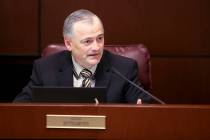Surge in chronically ill inmates taxes Nevada prisons

CARSON CITY — The Nevada Department of Corrections is seeing an alarming uptick in chronically ill prisoners, the agency told lawmakers on Tuesday.
The news came as Director James Dzurenda presented to the Assembly Judiciary Committee on the second day of the Nevada Legislature’s 80th session.
Chronically ill patients often require extended stays at outside hospitals, Dzurenda said. That means a surge in overtime for corrections officers who are tasked with accompanying patients.
“We’re getting more inmates in our front door that need more medical services than ever before,” Dzurenda said.
Comparing 2015 and 2018, the agency has seen a 22 percent increase in chronically ill prisoners. More than 500 prisoners combined spent nearly 4,000 days in hospitals last year, Dzurenda said.
That is a 45 percent increase in hospital admissions and a 52 percent increase in daily hospital stays, he said.
Dzurenda noted that each time an inmate is sent to an outside hospital, two officers are sent to stand guard. And because there are three officer shifts in a day, a total of six officers are tasked to work overtime — per patient, per day.
“It’s not unusual for the Department of Corrections to have 20 and 30 (patients) a night — overnight — at an outside hospital,” Dzurenda said. “So that could be up to 60 to 70 officers on overtime in one day to watch (those inmates) in the outside hospital.”
The agency has changed its procedures to transport patients to the same hospitals, “so we can share resources,” he said. But sometimes, in emergencies, that’s not possible. And while local police officers can help watch inmates, the problem persists.
Other issues
Dzurenda also noted that the Department of Corrections is trying to digitize its medical records. Everything is done on paper now, which makes information sharing difficult, he said.
“Because of broadband issues, we cannot connect still,” Dzurenda said. “We’re still working on that. That’s going to be a big part of this session — how we can actually, finally connect all of our facilities on broadband so that we can transfer, electronically, information.”
Dzurenda told committee members that he is focused on justice reinvestment: a data-driven approach to cutting corrections spending and reinvesting in ways to prevent people from entering prison in the first place or winding back up in the system.
Examples include sentencing reform and investing in mental health and addiction services.
Dzurenda pointed out a “devastating” reason why it’s a priority for him: 60 percent of the female prison population in Nevada is incarcerated for nonviolent crimes, according to a prison population review by the Crime and Justice Institute at Community Resources for Justice.
“That’s something that I think is very important to stress because we’ve got to do something in our community so we don’t get in the prison system those that do not need to be there,” Dzurenda said. “There has to be other options. And that’s what the justice reinvestment looks at.”
There is still work to be done in terms of issuing IDs to released prisoners, a requirement passed in the last legislative session.
Dzurenda said the agency had no birth certificate on file for more than 8,000 of the 13,000 inmates. That could be because inmates were born in other countries, inmates do not know where they were born or did not reveal their true identities upon incarceration, he hypothesized.
This session, he plans to advocate for a statutory change that would allow prisons to issue released prisoners an alternative, non-verified ID, “so they have something” to access to services, Dzurenda said.
Agency successes
Highlighting the agency’s successes, Dzurenda told committee members that DNA samples from more than 12,900 Nevada inmates have been put into the FBI’s CODIS database, which can link DNA samples to other crimes throughout the country.
The samples have resulted in hits for finding matches for three homicides, five sexual assaults, one robbery, two burglaries and one auto theft case. The agency expects another 278 inmate DNA samples will be added this spring.
Dzurenda also said his agency has altered its use-of-force policy, introducing more nonlethal weapons to break up fights and increasing verbal de-escalation training.
Shortly after the director’s presentation, Assemblyman Steve Yeager, D-Las Vegas, ended Tuesday’s Judiciary Committee meeting about 11:25 a.m. Legislators did not have time to ask questions because the meeting started two hours late after weather delays and they were due on the Assembly floor at 11:30 a.m.
“I thought it was important to hear from the Department of Corrections because many of these bills that we’re dealing with in the criminal justice realm are going to pull in the Department of Corrections, whether it’s in terms of who is going into the department or who is coming out, when they’re coming out, what kind of services that they’re getting,” said Yeager, who chairs the committee. “So hopefully this was helpful.”
^
Contact Rachel Crosby at rcrosby@reviewjournal.com or 702-477-3801. Follow @rachelacrosby on Twitter.













